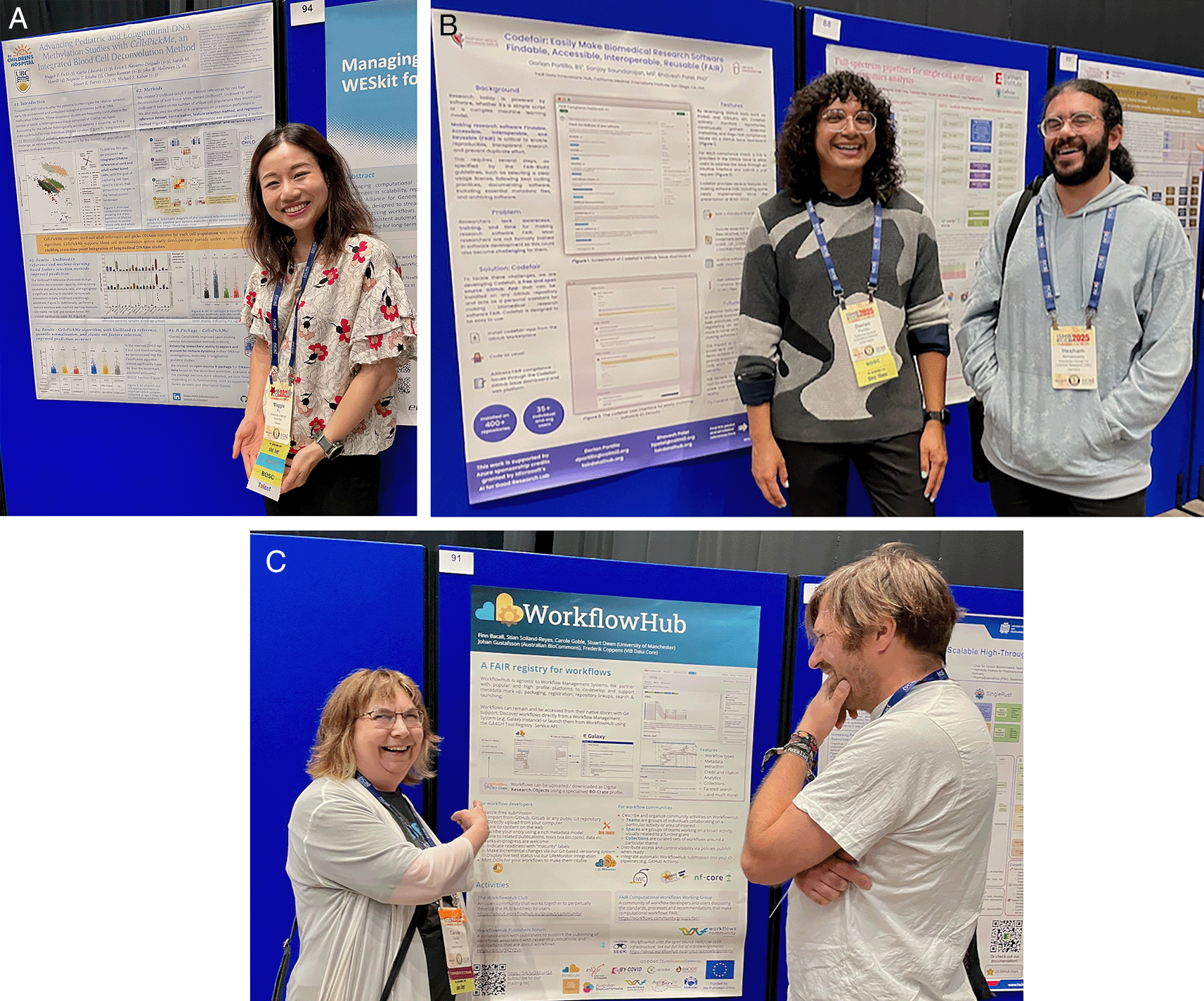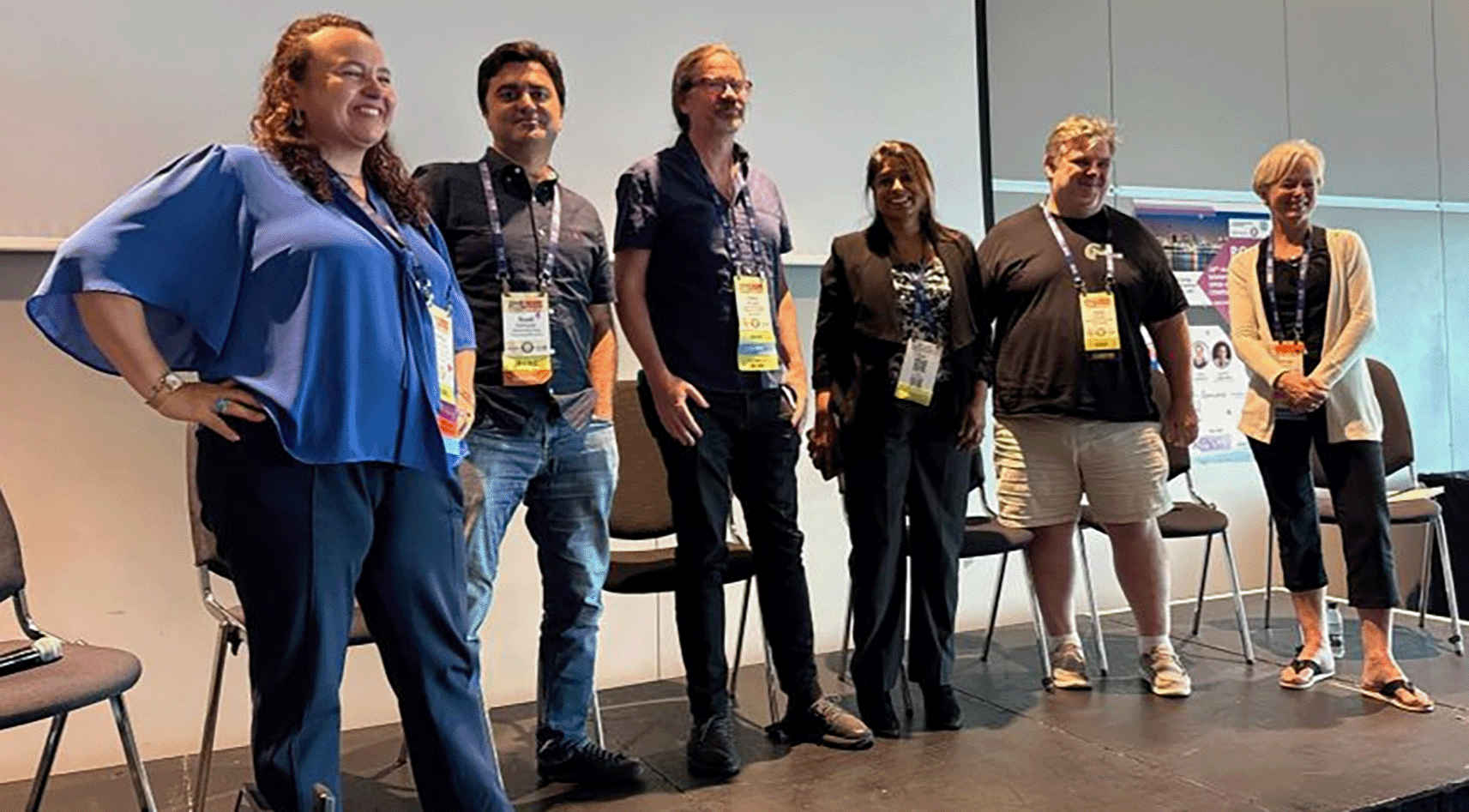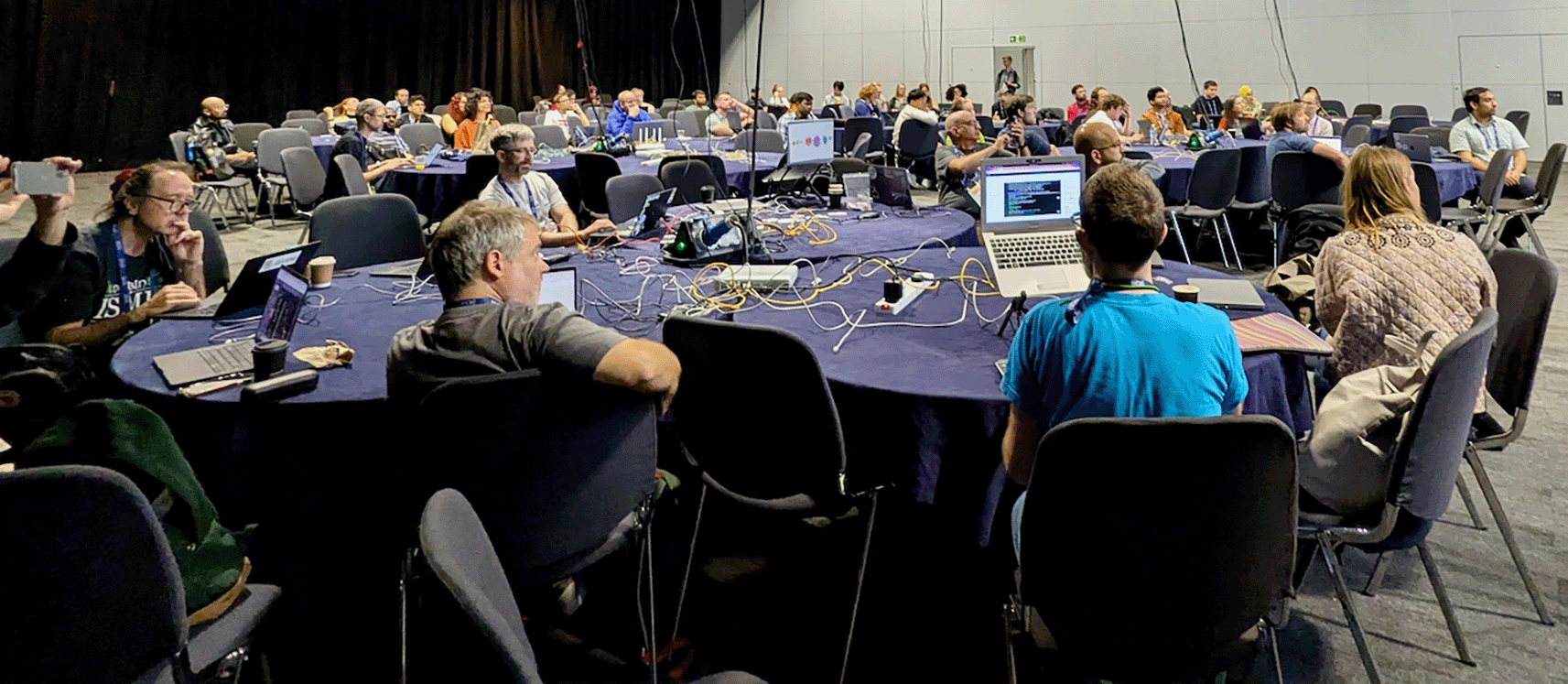Keywords
bioinformatics; open source; open science; open data; data sustainability
This article is included in the Bioinformatics Open Source Conference (BOSC) collection.
The 26th annual Bioinformatics Open Source Conference (BOSC 2025, open-bio.org/events/bosc-2025) brought its community-driven focus on open-source bioinformatics and open science to the 2025 conference on Intelligent Systems for Molecular Biology and the European Conference on Computational Biology (ISMB/ECCB 2025). Since its launch in 2000, BOSC has been the premier annual meeting covering open-source bioinformatics and open science.
Framed by two keynote addresses and a thought-provoking panel discussion, the two-day conference included sessions dedicated to open data, analytic tools and pipelines, workflow platforms, knowledge representation, and the application of AI/ML.
The first keynote talk was delivered by Christine Orengo: “Working together to develop, promote and protect our data resources: Lessons learnt developing CATH and TED.” A joint session with the Bio-Ontologies and Knowledge Representation (BOKR) track the second day of BOSC started with a keynote talk by Chris Mungall entitled “Open Knowledge Bases in the Age of Generative AI”. A closing panel on Data Sustainability, moderated by Mónica Muñoz Torres, featured panelists Scott Edmunds, Varsha Khodiyar, Tony Burdett, Nicky Mulder, and Chris Mungall.
This year, the CollaborationFest collaborative work event that typically precedes or follows ISMB was incorporated as part of the main conference and organized by BOSC with help from the Function and 3D-SIG tracks.
bioinformatics; open source; open science; open data; data sustainability
The 26th annual Bioinformatics Open Source Conference (BOSC 2025, open-bio.org/events/bosc-2025) took place in Liverpool, UK, as part of the 2025 conference on Intelligent Systems for Molecular Biology and the European Conference on Computational Biology (ISMB/ECCB 2025). Total in-person attendance at ISMB/ECCB 2025 was a record-breaking 2283, with an additional 312 online participants. Attendance at BOSC peaked at 283 in-person attendees (Figure 1), with additional online participants.
BOSC 2025 included two full days of talks and posters covering a wide range of topics in open science and open source bioinformatics, with two keynote talks and a panel discussion. The second day of BOSC was a joint session with the Bio-Ontologies and Knowledge Representation (BOKR) track.
Every year since 2000, the Bioinformatics Open Source Conference (BOSC) has been the key annual meeting for people involved in some aspect of open source or open science in bioinformatics. Last year’s conference, BOSC 2024, was the 25th BOSC, but this year marked 25 years since the first BOSC in 2000, so we took advantage of the off-by-one confusion (all too familiar to bioinformaticists) to celebrate our 25th birthday again at BOSC 2025.
BOSC is entirely volunteer run. Nomi Harris, a program manager at the Lawrence Berkeley National Laboratory, has led BOSC since 2012. The organizing committee (Figure 2) and review committee ensured a rigorous abstract selection process, with each submission receiving three independent reviews. BOSC’s commitment to transparency extends to its review process and rubric, documented and publicly available since 2020.
The conference began with a welcome from chair Nomi Harris, followed by an overview of BOSC’s parent organization, the Open Bioinformatics Foundation, by OBF President Peter Cock (Figure 3). The opening session closed with a tribute to Peter Amstutz, a very active member of the bioinformatics open-source community who passed away recently. Peter contributed his energy and vision to many BOSCs and CollaborationFests, and co-founded the widely used Common Workflow Language (CWL), which was conceived at the BOSC 2014 CoFest. The tribute was presented by Michael Crusoe, Peter’s collaborator and co-founder of CWL (Figure 4).
The first BOSC 2025 keynote talk was delivered by Dr. Christine Orengo: “Working together to develop, promote and protect our data resources: Lessons learnt developing CATH and TED” (Figure 5). Dr. Orengo is the Vice President of the ISCB and was previously the ISCB’s first female President. Dr. Orengo’s talk covered the history of CATH (which is celebrating its 30th anniversary) and the insights CATH and TED provided about protein structure and function, while also providing a model of how to bring the community together to sustain a resource. Interestingly, this involved working together with competitors to improve each other’s approaches.
The joint BOSC/BOKR session was kicked off by keynote speaker Chris Mungall (Figure 6), who wove together his work on agentic AI, ontologies and knowledge bases to describe a “future of bioinformatics” that is in fact happening right now. While we have heard a great deal on the limits of LLMs, some of Dr. Mungall’s latest work examines the potential of agentic AI as an important aid for biocuration. As the number of tools grows, an under-recognized challenge will be evaluating and benchmarking the utility and reproducibility of these tools. One strategy for examining AI agent work benefits from the long history of provenance around curator maintenance of ontologies. Dating back to pre-GitHub times—circa 2002—this evidence trail allows evaluation work to directly compare how AI decisions are compared with the work of human curators. The talk ended with Dr. Mungall’s reflections on AI ethics, particularly related to circumstances where an AI might be tasked with conflicting policy directives.
In addition to the two keynotes, BOSC 2025 included 35 talks chosen from submitted abstracts (Figure 7) and 47 posters presented in person or online (Figure 8). This year’s session topics included open science, open data, analytic tools and pipelines, workflow platforms, knowledge representation, and AI/ML. The complete lists of talks and posters can be found at https://www.open-bio.org/events/bosc-2025/bosc-2025-schedule/.

The first talk session covered topics related to open science, including code sharing practices, a case study on how open science is advancing bioinformatics in a low-resource region (Nigeria), and guidelines for FAIR research. The next two sessions focused on some of the core areas in open-source bioinformatics development, including tools and pipelines for data analysis, workflow systems, and developer toolkits. Day 1 closed with a session on open data which highlighted the need for AI-readiness and interoperability.
Day 2, which was combined with BOKR, included a session on AI/ML, with an emphasis on open approaches, sharing of models, and reusability. The next session, which focused on ontologies and knowledge representation, again included a lot of AI. The session was bookended by talks about two of the most popular biomedical ontology resources, BioPortal and AberOWL. Next, a short talk on the global biodata infrastructure by Guy Cochrane led directly into the closing panel on Data Sustainability.
Our panel on Data Sustainability (Figure 9) tackled a critical question facing modern science: How do we ensure that the vast digital knowledge we generate today remains accessible, reliable, and valuable for generations to come? We defined data sustainability as a proactive approach to keeping bioinformatics data FAIR (Findable, Accessible, Interoperable, Reusable), ethically managed, and secure through robust infrastructure, funding, expertise, and governance.

The discussion quickly moved beyond principles to practical realities. Panelists agreed that while foundational guidelines like FAIR and CARE are essential, they are not a complete solution. They can introduce costs, and don’t inherently solve the complex challenges of governance and long-term funding. True sustainability cannot be achieved with a simple checklist; it requires building community-driven standards and frameworks, such as those developed by the Global Alliance for Genomics and Health (GA4GH), to ensure responsible data sharing.
A powerful theme emerged from the discussion: sustainability is fundamentally about people, not just data. The conversation repeatedly highlighted the urgent need to formally recognize, train, and establish career paths for the data stewards, biocurators, and bioethicists who are the guardians of our collective knowledge. As one panelist noted, we should invest less in creating perfectly static archives and more in cultivating the networks of people who can care for datasets, allowing them to evolve and grow over time.
Ultimately, the panel concluded that ensuring the future of our data requires a cultural shift. It means moving beyond simply asking for more funding and toward building resilient, adaptable ecosystems. It demands that we value the human expertise that underpins our data infrastructure and work together to face a landscape where data is not only at risk of being lost, but also of being devalued or attacked. Our collective digital legacy depends on it.
BOSC has held CollaborationFests (aka CoFests) every year before or after ISMB since 2010. CoFests are a two-day collaborative work event at which participants work together to contribute code, documentation, training materials, and challenging analysis problems and use cases. This year, we decided to hold the CollaborationFest as part of ISMB/ECCB and open it to all registered ISMB/ECCB participants. The co-organizers were Hervé Ménager (BOSC), Iddo Friedberg (Function COSI), and Ben Busby (Figure 10).
Over 60 people participated in CoFest, with about 50 in person and 10 online (Figure 11 and Figure 12). CoFest participants worked together on nine main projects. A wide range of projects were undertaken, addressing topics such as genome annotation, HiC data analysis, protein function annotation, proteomics annotation, workflows, data processing, databases, and AI/ML approaches. A summary of the CoFest projects is provided in Table 1.

| Project title | Keywords | Links |
|---|---|---|
| Improving how we describe and discover Bioinformatics tools | Software, metadata, LLM | https://github.com/edamontology/edammcp |
| Collaborative development of gRINN for interaction energy based analysis of biomolecular simulation trajectories | Residue interaction, energy-based analysis of protein MD simulation trajectories | https://www.github.com/osercinoglu/grinn-ismb-2025, https://www.github.com/osercinoglu/grinn |
| Python 3.14 testing | CWL, Python | https://github.com/common-workflow-language/schema_salad/releases/tag/8.9.20250723145140 https://github.com/common-workflow-language/cwl-utils/releases/tag/v0.39 https://github.com/galaxyproject/bioblend/pull/510 |
| README Generation | Software description, LLM | https://github.com/slugb0t/llm-readme-comparisons |
| Use LinkML in the Comprehensive Antibiotic Resistance Database (CARD) | Antibiotic Resistance Database, LinkML | https://linkml.io/linkml/developers/schemaview.html |
| schemas.science genAI-assisted training | JSON-LD, metadata, LLMs | https://github.com/PhilReedData/ismb2025cofest |
| Biopython, Python & GPUs | GPU, Python | https://github.com/rapidsai/cuxfilter
https://biopython.org/ |
| iCn3d & Jalview - MSA/Structure | Javascript, 3D, MSA | https://github.com/ncbi/icn3d |
| Proteomics metadata | Proteomics, metadata, text-mining | https://github.com/SparkyDaBear/Intelligent_MetaData_ISMB_collaboration_fest_2025/ |
| How much funding per protein? | Python, R, Protein, data analysis | https://github.com/anphan0828/funding-per-protein-hackathon |
| Enhancing protein knowledge curation using GO annotations and LLMs for community literature submissions | Gene Ontology, LLMs | https://github.com/anphan0828/ISMB_CollaborationFest_EBI/ |
| Identifying genomic safe harbor sites in Zebrafish at different development stages, incorporating 3D chromosome data using an integrative genomics approach | Integrative genomics, HiC data | https://github.com/parnaljoshi/gsh-zebrafish-hackathon |
The BOSC organizing committee, which consists entirely of volunteers, devotes substantial effort and resources to making BOSC more diverse and accessible (see our DEI page). We do all we can to spread the word about BOSC to as wide an audience as possible, and we offer financial support to help lower the barriers to participation.
Any author who submits an abstract to BOSC can privately request financial assistance for conference registration fees. This initiative, funded by generous sponsors (see https://www.open-bio.org/events/bosc/sponsors/ and the Acknowledgements below), has enabled us to offer free ISMB registration to dozens of BOSC participants, primarily from underrepresented groups in the field. In 2025, thanks to our sponsors, we provided free registration to 12 presenters, 10 of whom belong to underrepresented groups in our community. BOSC sponsorships also fund the Open Bioinformatics Foundation’s Event Awards, which are aimed at increasing diverse participation at events promoting open-source bioinformatics and open science, including (but not limited to) BOSC.
Our BOSC keynote speaker selection process has been designed to support inclusivity and transparency. In the first phase of the yearly process, we invite the community to submit nominations for potential speakers. Shortlisted candidates are then evaluated using our established Invited Speaker Rubric, followed by a call for community feedback regarding any potential concerns. After reviewing the feedback, we make the final selection, ensuring that our keynote speakers represent a diverse spectrum of perspectives and backgrounds.
Making BOSC both successful and inclusive is a lot of work. Our greatest reward is hearing from participants that BOSC provides a truly welcoming and inspiring home for collaboration. First-time attendee Daniel Korn described his experience as the “greatest highlight of my international journey,” adding that “at every step… I felt included in a community of programmers and academics focused on tackling big problems of biomedical software.” This feeling was echoed by Sebastian Ayala Ruano, who shared that “attending BOSC was an incredible experience. I discovered inspiring research projects and open-source tools, while connecting with a welcoming community.” These stories of connection and inclusion are the reason we do this work; they are the inspiration that ensures we will be back next year.
All photos in this report are shared under a CC-BY-SA license. All identifiable subjects in the photos were contacted, and they consented to have their photos used in this report.
We are grateful to all who helped make BOSC 2025 a success: the organizers, reviewers, volunteers, presenters, attendees, and the generous sponsors who enabled us to offset some meeting expenses and provide free registration to 15 participants. We thank Platinum sponsor Chan-Zuckerberg Initiative, Gold sponsor Seqera, and Silver sponsor GigaScience for their support. Special thanks to Seqera for providing socks!
We thank ISCB staff, particularly Seth Mulholland and Bel Hanson, for helping ISMB/ECCB 2025 run smoothly, even with a record number of attendees.
Hervé Ménager, Iddo Friedberg, and Ben Busby were the main organizers of CoFest. Peter Cock, Núria Queralt Rosinach, Tazro Ohta and Ravi Abrol also participated in the preparation of the CoFest. Thank you to Iddo for providing swag, and to the people who developed the CoFest challenges: Wout Bittremieux, Ian Sitarik, Kunal Suresh, Parnal Joshi, An Phan, and Yvonne Lussi.
Thank you to Peter Cock for reading and commenting on this manuscript.
| Views | Downloads | |
|---|---|---|
| F1000Research | - | - |
|
PubMed Central
Data from PMC are received and updated monthly.
|
- | - |
This article is an Editorial and has not been subject to external peer review.
Provide sufficient details of any financial or non-financial competing interests to enable users to assess whether your comments might lead a reasonable person to question your impartiality. Consider the following examples, but note that this is not an exhaustive list:
Sign up for content alerts and receive a weekly or monthly email with all newly published articles
Already registered? Sign in
The email address should be the one you originally registered with F1000.
You registered with F1000 via Google, so we cannot reset your password.
To sign in, please click here.
If you still need help with your Google account password, please click here.
You registered with F1000 via Facebook, so we cannot reset your password.
To sign in, please click here.
If you still need help with your Facebook account password, please click here.
If your email address is registered with us, we will email you instructions to reset your password.
If you think you should have received this email but it has not arrived, please check your spam filters and/or contact for further assistance.
Comments on this article Comments (0)